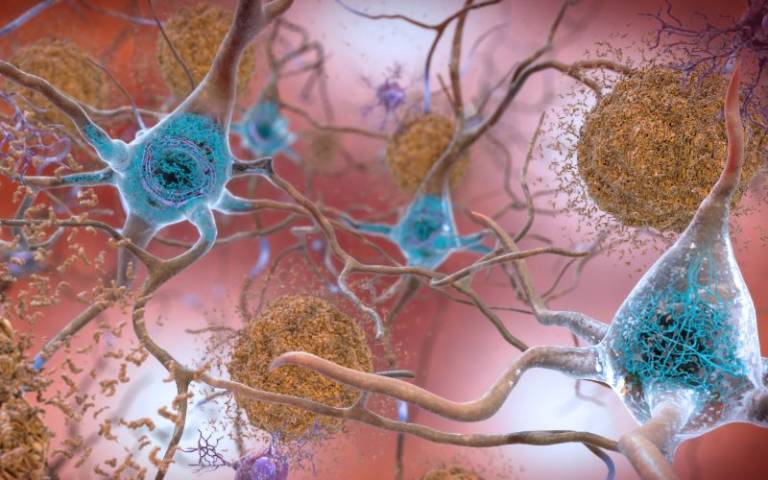Potential cognitive benefits of major Alzheimer’s risk gene
8 October 2021
A well-known gene that increases Alzheimer’s risk, called APOE4, has now been linked with better visual working memory in older adults, finds a new study led by UCL Queen Square Institute of Neurology researchers.

The findings published in Nature Aging are based in study of a unique group of volunteers, who were all born in the same week in 1946.
Joint senior author Professor Jonathan Schott (Dementia Research Centre, UCL Queen Square Institute of Neurology) said: “We have long known that possession of an APOE4 risk gene increases risk for Alzheimer’s disease, but the exact mechanism by which it does so remains uncertain.
“Our finding – from a sample of individuals from across mainland Britain who were all born in the same week in 1946 – that carrying an APOE4 gene was associated with better visual memory may provide clues to why this gene variant is so common. Understanding why APOE4 might result in better memory, may also help us to understand why it also leads to increased risk for Alzheimer’s disease.”
Our DNA code is the blueprint for our biology. It holds the information needed to make specific proteins, which allow our bodies to function. Sometimes the DNA code can contain changes that increase our likelihood of getting a disease. To date, scientists have found versions of at least 30 different genes that are associated with an altered risk of developing Alzheimer’s disease, the most common cause of dementia.
The most studied gene with the largest effect on our Alzheimer’s risk is called APOE. Everyone has two copies of the APOE gene each of which can take three forms (E2, E3, E4). People who inherit one copy of the APOE E4 version (roughly one in four people) are around three times more likely to develop Alzheimer’s disease, compared to people without this version of the gene. Those with two copies may be more than eight times more likely to develop Alzheimer’s.
Some evidence suggests that APOE4 might confer some advantages, explaining the survival of this gene in the population.
The UCL team led by Dr Kirsty Lu and Professors Seb Crutch and Jonathan Schott worked with a unique group of nearly 400 volunteers, recruited from the Medical Research Council National Survey of Health and Development (NSHD) 1946 British Birth Cohort. They were all born in the same week in 1946 and did not have dementia.
The team assessed the effects of the APOE4 risk gene, and b-amyloid – one of the hallmark Alzheimer’s proteins – as measured by a PET brain scan, on visual working memory.
Scientists used a computerised ‘What was where?’ task designed by colleagues at Oxford University to measure volunteers’ visual working memory. This task involved participants being shown one to three objects displayed on a screen in random locations, presented on a black background. Scientists asked participants to look at the objects and to try to remember their identities and locations.
In 398 study participants who do not have memory and thinking problems, having the APOE4 gene and the presence of b-amyloid in the brain had opposing effects on object identification, with APOE4 predicting better recall and amyloid build-up predicting poorer recall. APOE4 carriers were also able to recall locations more precisely.
The results, suggesting better visual working memory in those with APOE4, suggests that there are some benefits of this gene in the older age, and even when proteins associated with Alzheimer’s disease are building up.
Dr Kirsty Lu (Dementia Research Centre, UCL Queen Square Institute of Neurology), first author on the study, said: “Previous evidence has suggested that the APOE4 gene is one of various genetic variants that cause harm late in life, but may confer benefits earlier in life, during or before reproductive years. Here we have found that APOE4’s benefits may in fact persist into old age, at the same time that the harms of Alzheimer’s disease are beginning to develop.”
Dr Susan Kohlhaas, Director of Research at Alzheimer’s Research UK, the study’s funders, said: “Alzheimer’s disease is the most common cause of dementia and a combination of risk factors including our age, lifestyle, and genetics play a role in determining our individual risk. We know the APOE4 gene can increase our overall risk of developing Alzheimer’s but having a copy doesn’t mean people will definitely go on to develop the disease.
“This new research highlights that there is still a lot to be understood about these genes, their role in the development of Alzheimer’s, and intriguingly what effects they may have beyond the disease. While this research may be of little comfort for those living with Alzheimer’s, better understanding the most impactful Alzheimer’s risk gene is crucial for building a more complete picture of the development of the disease.
“While we cannot change our age or genes, some research has found that even if you carry a risk gene, there are still things you can do to reduce your risk.”
Links
- Research paper in Nature Aging
- Professor Jonathan Schott’s academic profile
- Dr Kirsty Lu’s academic profile
- Professor Seb Crutch’s academic profile
- UCL Dementia Research Centre, UCL Queen Square Institute of Neurology
Source
Image
- The two brain proteins previously known to play major roles in dementia diseases: beta-amyloid plaques (seen in brown) and tau (seen in blue) in the brain. Credit: National Institute on Aging, NIH, on Flickr
 Close
Close

